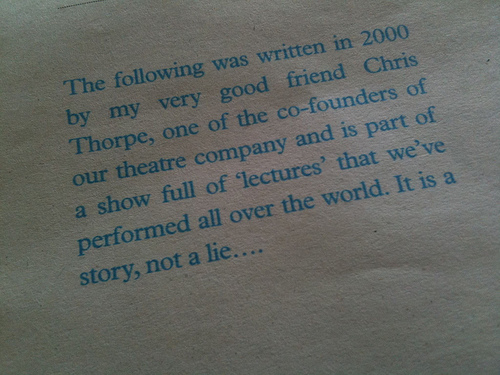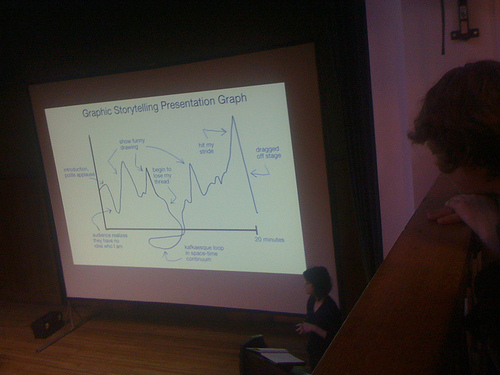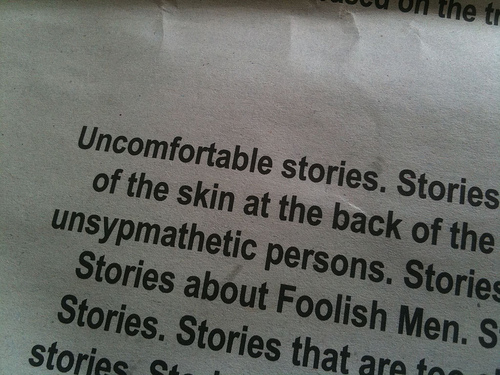On Friday I went to The Story, a conference organised by Matt Locke of Channel 4. It was very good, and also confusing. In a good way. And because it was confusing this won’t be a straight trip report: it will be some hastily scrawled notes and some linked reflections. Attempt no summaries here.

[For some reason I still have Rabelais and Kharitonov and the Little Room in my head. I’m not sure why. Perhaps writing this will tell me.]
I say a conference in disguise because what happened and what nobody seemed to be expecting was that most of the speakers did not give talks, they told stories. This was most pronounced at the start of the day, at the height of the audience’s confusion: Cory Doctorow read his short story on the future of bookselling. Dr Aleks Krotoski outlined a personal history of making the BBC’s Virtual Revolution series [sidenote: if you haven’t seen Aleks’ 1984 project, go here and hit the slideshow button now]. John Spooner went for a walk around the idea of the neutrino. Tim Etchells prefaced his contribution with the words “its status as a story is debatable. But it’s definitely obscene.”
The effect was as if the audience had been tricked into attending a spoken word event, masquerading as a conference. The overarching themes of the day, as it unfolded, were lying and discomfort. Nobody said that aloud. I’m not sure if anyone else thought that.
Sydney Padua, of the marvellous Babbage and Lovelace comics, presented a metaslide on graphic storytelling: a graph of a presentation. A metapresentation for a metaconference.

[photo CC gill wildman]
Tony White, booktwo collaborator on Artists’ Ebooks, talked about his practice, and read Include Me Out over a pecha kucha-style slideshow, a layered context of story and backstory and format and source: all presented together, at once, overwhelming and slightly disturbing. It broke, quite deliberately, your attempts to understand everything. Possibly the most interesting effect of the day.
I wish I’d seen/participated in (what is the word for this?) A Small Town Anywhere, Coney‘s piece of participative theatre. Find out more. Coney’s Annette Mees said “a format is a weird place to start when you want to tell a story.” This is devastatingly true.
Tassos Stevens said something like: “Meaning is found in complexity, the point at which things break and fall apart, where you have to make hard, difficult choices.” Yes.
In the theatre, play-testing is called “scratching”. (Speaking of play-testing, it’s Sandpit tonight. You should go.) What Coney does feels less like writing a story, and more like writing a framework, with associated tests and walkthroughs. A script that is run rather than followed.
[At lunch, I had a really, really good talk with Eliot about wikihistory, wikiality, the way in which truth and history and opinion are related and constructed, and the stories this tells and the stories that can be told with it. I need to write more—a lot more—about this, soon.]
I’m not much of a gamer, and I haven’t played Failbetter’s Echo Bazaar, but I’ve been watching a lot of other people play it, and marvelling at the richness of the story. (James Wallis has said: it is more story than game.) (From something Alexis Kennedy said, I remembered I am that most casual of gamers: “playing for shits & giggles” as he put it. Shooting friendly NPCs. Going for stars in GTA.)
To make the Echo Bazaar, it was necessary to remake narrative, by “making up cool names for stuff”. Magick is all about naming and control. So is journalism, and software engineering—related disciplines.
Someone dreaming about your story, in your world, is probably the highest form of praise. Fires in the desert: the points where you see what’s going on, how far you’ve come and where you can go next. Also the points that linger longest in the mind.
Half-way through Tim Wright‘s story I wrote in my notebook: “Tim’s pulling a bait and switch.” He was—a quite devastating one, that left the audience stunned into silence. Lying and discomfort: only rivalled by Tim Etchells’ repetitive lists of celebrities dead and/or covered in semen. (cf Ulrich Haarbürste.)
The last note I have says: “Just a work of fiction.” I’m not sure what this refers to. Someone said it, and I thought: nothing is just a work of fiction.
A lot of people seemed to be struggling to justify their day at the conference—to themselves, and to their boss, real or imagined. Unsure why they were there, what they were getting out of it. An edge conference. I’ve made it sound darker and more confusing than it was: perhaps that’s my mood. Other reports are available.
Lying and discomfort. Sorry. I’ll stop saying that now.

[…] have been some great blog posts by some of the attendees – Charles from Mudlark, James Bridle, Susi O’Neill, Adam Gee, Jane Young, Rebecca Denton, Vicky Matthews, Jez Paxman, Meg Pickard […]
Pingback by The End of The Story 2010 « The Story — February 22, 2010 @ 4:07 pm
[…] The Story: Notes on a conference in disguise | booktwo.org (tags: conference software storytelling) […]
Pingback by links for 2010-02-23 at adam hoyle presents suckmypixel — February 23, 2010 @ 1:30 pm
Really good summary of the day that – I’m still not sure how much was true in Tim Wright’s story TBH.
Comment by Grill — February 23, 2010 @ 3:58 pm